- Home
- Roald Dahl
Fear Page 11
Fear Read online
Page 11
Miss Gribbin jumped up as if in anger, but her brow was smooth and her mouth dropped at the corners.
‘Mr Everton,’ she said, ‘I wish you had not told me all this.’ Her lips worked. ‘You see,’ she added unsteadily, ‘I don’t believe in telepathy.’
Easter, which fell early that year, brought little Gladys Parslow home for the holidays to the Vicarage. The event was shortly afterwards signalized by a note from the Vicar to Everton, inviting him to send Monica down to have tea and play games with his little daughter on the following Wednesday.
The invitation was an annoyance and an embarrassment to Everton. Here was the disturbing factor, the outside influence, which might possibly thwart his experiment in the upbringing of Monica. He was free, of course, simply to decline the invitation so coldly and briefly as to make sure that it would not be repeated; but the man was not strong enough to stand on his own feet impervious to the winds of criticism. He was sensitive and had little wish to seem churlish, still less to appear ridiculous. Taking the line of least resistance he began to reason that one child, herself no older than Monica, and in the atmosphere of her own home, could make but little impression. It ended in his allowing Monica to go.
Monica herself seemed pleased at the prospect of going but expressed her pleasure in a discreet, restrained, grown-up way. Miss Gribbin accompanied her as far as the Vicarage doorstep, arriving with her punctually at half past three on a sullen and muggy afternoon, and handed her over to the woman-of-all-work who answered the summons at the door.
Miss Gribbin reported to Everton on her return. An idea which she conceived to be humorous had possession of her mind, and in talking to Everton she uttered one of her infrequent laughs.
‘I only left her at the door,’ she said, ‘so I didn’t see her meet the other little girl. I wish I’d stayed to see that. It must have been funny.’
She irritated Everton by speaking exactly as if Monica were a captive animal which had just been shown, for the first time in its life, another of its own kind. The analogy thus conveyed to Everton was close enough to make him wince. He felt something like a twinge of conscience, and it may have been then that he asked himself for the first time if he were being fair to Monica.
It had never once occurred to him to ask himself if she were happy. The truth was that he understood children so little as to suppose that physical cruelty was the one kind of cruelty from which they were capable of suffering. Had he ever before troubled to ask himself if Monica were happy, he had probably given the question a curt dismissal with the thought that she had no right to be otherwise. He had given her a good home, even luxuries, together with every opportunity to develop her mind. For companions she had himself, Miss Gribbin, and, to a limited extent, the servants …
Ah, but that picture, conjured up by Miss Gribbin’s words with their accompaniment of unreasonable laughter! The little creature meeting for the first time another little creature of its own kind and looking bewildered, knowing neither what to do nor what to say. There was pathos in that – uncomfortable pathos for Everton. Those imaginary friends – did they really mean that Monica had needs of which he knew nothing; of which he had never troubled to learn?
He was not an unkind man, and it hurt him to suspect that he might have committed an unkindness. The modern children whose behaviour and manners he disliked were perhaps only obeying some inexorable law of evolution. Suppose in keeping Monica from their companionship he were actually flying in the face of Nature? Suppose, after all, if Monica were to be natural, she must go unhindered on the tide of her generation?
He compromised with himself, pacing the little study. He would watch Monica much more closely, question her when he had the chance. Then, if he found she was not happy, and really needed the companionship of other children, he would see what could be done.
But when Monica returned home from the Vicarage it was quite plain that she had not enjoyed herself. She was subdued, and said very little about her experiences. Quite obviously the two little girls had not made very good friends. Questioned, Monica confessed that she did not like Gladys – much. She said this very thoughtfully with a little pause before the adverb.
‘Why don’t you like her?’ Everton demanded bluntly.
‘I don’t know. She’s so funny. Not like other girls.’
‘And what do you know about other girls?’ he demanded, faintly amused.
‘Well, she’s not a bit like –’
Monica paused suddenly and lowered her gaze.
‘Not like your “friends”, you mean?’ Everton asked.
She gave him a quick, penetrating little glance and then lowered her gaze once more.
‘No,’ she said, ‘not a bit.’
She wouldn’t be, of course. Everton teased the child with no more questions for the time being, and let her go. She ran off at once to the great empty room, there to seek that uncanny companionship which had come to suffice her.
For the moment Everton was satisfied. Monica was perfectly happy as she was, and had no need of Gladys or, probably, any other child friends. His experiment with her was shaping successfully. She had invented her own young friends, and had gone off eagerly to play with the creations of her own fancy.
This seemed very well at first. Everton reflected that it was just what he would have wished, until he realized suddenly with a little shock of discomfort that it was not normal and it was not healthy.
Although Monica plainly had no great desire to see any more of Gladys Parslow, common civility made it necessary for the Vicar’s little daughter to be asked to pay a return visit. Most likely Gladys Parslow was as unwilling to come as was Monica to entertain her. Stern discipline, however, presented her at the appointed time on an afternoon pre-arranged by correspondence, when Monica received her coldly and with dignity, tempered by a sort of grown-up graciousness.
Monica bore her guest away to the big empty room, and that was the last of Gladys Parslow seen by Everton or Miss Gribbin that afternoon. Monica appeared alone when the gong sounded for tea, and announced in a subdued tone that Gladys had already gone home.
‘Did you quarrel with her?’ Miss Gribbin asked quickly.
‘No-o.’
‘Then why has she gone like this?’
‘She was stupid,’ said Monica, simply. ‘That’s all.’
‘Perhaps it was you who was stupid. Why did she go?’
‘She was frightened.’
‘Frightened!’
‘She didn’t like my friends.’
Miss Gribbin exchanged glances with Everton.
‘She didn’t like a silly girl who talks to herself and imagines things. No wonder she was frightened.’
‘She didn’t think they were real at first, and laughed at me,’ said Monica, sitting down.
‘Naturally!’
‘And then when she saw them –’
Miss Gribbin and Everton interrupted her simultaneously, repeating in unison and with well-matched astonishment, her two last words.
‘And when she saw them,’ Monica continued, unperturbed, ‘she didn’t like it. I think she was frightened. Anyhow, she said she wouldn’t stay and went straight off home. I think she’s a stupid girl. We all had a good laugh about her after she was gone.’
She spoke in her ordinary matter-of-fact tones, and if she were secretly pleased at the state of perturbation into which her last words had obviously thrown Miss Gribbin she gave no sign of it. Miss Gribbin immediately exhibited outward signs of anger.
‘You are a very naughty child to tell such untruths. You know perfectly well that Gladys couldn’t have seen your “friends”. You have simply frightened her by pretending to talk to people who weren’t there, and it will serve you right if she never comes to play with you again.’
‘She won’t,’ said Monica. ‘And she did see them, Miss Gribbin.’
‘How do you know?’ Everton asked.
‘By her face. And she spoke to them too, when she ran to the door. They w
ere very shy at first because Gladys was there. They wouldn’t come for a long time, but I begged them, and at last they did.’
Everton checked another outburst from Miss Gribbin with a look. He wanted to learn more, and to that end he applied some show of patience and gentleness.
‘Where did they come from?’ he asked. ‘From outside the door?’
‘Oh, no. From where they always come.’
‘And where’s that?’
‘I don’t know. They don’t seem to know themselves. It’s always from some direction where I’m not looking. Isn’t it strange?’
‘Very! And do they disappear in the same way?’
Monica frowned very seriously and thoughtfully.
‘It’s so quick you can’t tell where they go. When you or Miss Gribbin come in –’
‘They always fly on our approach, of course. But why?’
‘Because they’re dreadfully, dreadfully shy. But not so shy as they were. Perhaps soon they’ll get used to you and not mind at all.’
‘That’s a comforting thought!’ said Everton with a dry laugh.
When Monica had taken her tea and departed, Everton turned to his secretary.
‘You are wrong to blame the child. These creatures of her fancy are perfectly real to her. Her powers of suggestion have been strong enough to force them to some extent on me. The little Parslow girl, being younger and more receptive, actually sees them. It is a clear case of telepathy and auto-suggestion. I have never studied such matters, but I should say that these instances are of some scientific interest.’
Miss Gribbin’s lips tightened and he saw her shiver slightly.
‘Mr Parslow will be angry,’ was all she said.
‘I really cannot help that. Perhaps it is all for the best. If Monica does not like his little daughter they had better not be brought together again.’
For all that, Everton was a little embarrassed when on the following morning he met the Vicar out walking. If the Rev. Parslow knew that his little daughter had left the house so unceremoniously on the preceding day, he would either wish to make an apology, or perhaps require one, according to his view of the situation. Everton did not wish to deal in apologies one way or the other, he did not care to discuss the vagaries of children, and altogether he wanted to have as little to do with Mr Parslow as was conveniently possible. He would have passed with a brief acknowledgement of the Vicar’s existence, but, as he had feared, the Vicar stopped him.
‘I had been meaning to come and see you,’ said the Rev. Parslow.
Everton halted and sighed inaudibly, thinking that perhaps this casual meeting out of doors might after all have saved him something.
‘Yes?’ he said.
‘I will walk in your direction if I may.’ The Vicar eyed him anxiously. ‘There is something you must certainly be told. I don’t know if you guess, or if you already know. If not, I don’t know how you will take it. I really don’t.’
Everton looked puzzled. Whichever child the Vicar might blame for the hurried departure of Gladys, there seemed no cause for such a portentous face and manner.
‘Really?’ he asked. ‘Is it something serious?’
‘I think so, Mr Everton. You are aware, of course, that my little girl left your house yesterday afternoon with some lack of ceremony.’
‘Yes, Monica told us she had gone. If they could not agree it was surely the best thing she could have done, although it may sound inhospitable of me to say it. Excuse me, Mr Parslow, but I hope you are not trying to embroil me in a quarrel between children?’
The Vicar stared in his turn.
‘I am not,’ he said, ‘and I am unaware that there was any quarrel. I was going to ask you to forgive Gladys. There was some excuse for her lack of ceremony. She was badly frightened, poor child.’
‘Then it is my turn to express regret. I had Monica’s version of what happened. Monica has been left a great deal to her own resources, and, having no playmates of her own age, she seems to have invented some.’
‘Ah!’ said the Rev. Parslow, drawing a deep breath.
‘Unfortunately,’ Everton continued, ‘Monica has an uncomfortable gift for impressing her fancies on other people. I have often thought I felt the presence of children about the house, and so, I am almost sure, has Miss Gribbin. I am afraid that when your little girl came to play with her yesterday afternoon, Monica scared her by introducing her invisible “friends” and by talking to imaginary and therefore invisible little girls.’
The Vicar laid a hand on Everton’s arm.
‘There is something more in it than that. Gladys is not an imaginative child; she is, indeed, a practical little person. I have never yet known her to tell me a lie. What would you say, Mr Everton, if I were to tell you that Gladys positively asserts that she saw those other children?’
Something like a cold draught went through Everton. An ugly suspicion, vague and almost shapeless, began to move in dim recesses of his mind. He tried to shake himself free of it, to smile and to speak lightly.
‘I shouldn’t be in the least surprised. Nobody knows the limits of telepathy and auto-suggestion. If I can feel the presence of children whom Monica has created out of her own imagination, why shouldn’t your daughter, who is probably more receptive and impressionable than I am, be able to see them?’
The Rev. Parslow shook his head.
‘Do you really mean that?’ he asked. ‘Doesn’t it seem to you a little far-fetched?’
‘Everything we don’t understand must seem farfetched. If one had dared to talk of wireless thirty years ago –’
‘Mr Everton, do you know that your house was once a girls’ school?’
Once more Everton experienced that vague feeling of discomfiture.
‘I didn’t know,’ he said, still indifferently.
‘My aunt, whom I never saw, was there. Indeed she died there. There were seven who died. Diphtheria broke out there many years ago. It ruined the school, which was shortly afterwards closed. Did you know that, Mr Everton? My aunt’s name was Mary Hewitt –’
‘Good God!’ Everton cried out sharply. ‘Good God!’
‘Ah!’ said Parslow. ‘Now do you begin to see?’
Everton, suddenly a little giddy, passed a hand across his forehead.
‘That is – one of the names Monica told me,’ he faltered. ‘How could she know?’
‘How indeed? Mary Hewitt’s great friend was Elsie Power. They died within a few hours of each other.’
‘That name too … she told me … and there were seven. How could she have known? Even the people around here wouldn’t have remembered names after all these years.’
‘Gladys knew them. But that was only partly why she was afraid. Yet I think she was more awed than afraid, because she knew instinctively that the children who came to play with little Monica, although they were not of this world, were good children, blessed children.’
‘What are you telling me?’ Everton burst out.
‘Don’t be afraid, Mr Everton. You are not afraid, are you? If those whom we call dead still remain close to us, what more natural than these children should come back to play with a lonely little girl who lacked human playmates? It may seem inconceivable, but how else explain it? How could little Monica have invented those two names? How could she have learned that seven little girls once died in your house? Only the very old people about here remember it, and even they could not tell you how many died or the name of any one of the little victims. Haven’t you noticed a change in your ward since first she began to – imagine them, as you thought?’
Everton nodded heavily.
‘Yes,’ he said, almost unwittingly, ‘she learned all sorts of tricks of speech, childish gestures she never had before, and games … I couldn’t understand. Mr Parslow, what in God’s name am I to do?’
The Rev. Parslow still kept a hand on Everton’s arm.
‘If I were you I should send her off to school. It may not be very good for her.’
&n
bsp; ‘Not good for her! But the children, you say –’
‘Children? I might have said angels. They will never harm her. But Monica is developing a gift of seeing and conversing with – with beings that are invisible and inaudible to others. It is not a gift to be encouraged. She may in time see and converse with others – wretched souls who are not God’s children. She may lose the faculty if she mixes with others of her age. Out of her need, I am sure, these came to her.’
‘I must think,’ said Everton.
He walked on dazedly. In a moment or two the whole aspect of life had changed, and grown clearer, as if he had been blind from birth and was now given the first glimmerings of light. He looked forward no longer into the face of a blank and featureless wall, but through a curtain beyond which life manifested itself vaguely but at least perceptibly. His footfalls on the ground beat out the words: ‘There is no death. There is no death.’
That evening after dinner he sent for Monica and spoke to her in an unaccustomed way. He was strangely shy of her, and his hand, which he rested on one of her slim shoulders, lay there awkwardly.
‘Do you know what I’m going to do with you, young woman?’ he said. ‘I’m going to pack you off to school.’
‘O-oh!’ she stared at him, half smiling. ‘Are you really?’
‘Do you want to go?’
She considered the matter, frowning and staring at the tips of her fingers.
‘I don’t know. I don’t want to leave them.’
‘Who?’ he asked.
‘Oh, you know!’ she said, and turned her head half shyly.
‘What? Your – friends, Monica?’
‘Yes.’
‘Wouldn’t you like other playmates?’
‘I don’t know. I love them, you see. But they said – they said I ought to go to school if you ever sent me. They might be angry with me if I was to ask you to let me stay. They wanted me to play with other girls who aren’t – who aren’t like they are. Because you know, they are different from children that everybody can see. And Mary told me not to – not to encourage anybody else who was different, like them.’
Everton drew a deep breath.

 My Uncle Oswald
My Uncle Oswald The Best of Roald Dahl
The Best of Roald Dahl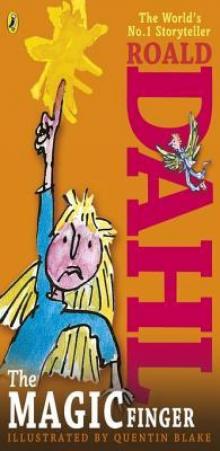 The Magic Finger
The Magic Finger Charlie and the Chocolate Factory
Charlie and the Chocolate Factory Fantastic Mr Fox
Fantastic Mr Fox Matilda
Matilda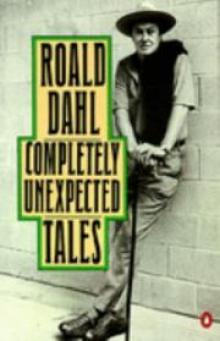 Completely Unexpected Tales: Tales of the Unexpected. More Tales of the Unexpected
Completely Unexpected Tales: Tales of the Unexpected. More Tales of the Unexpected The Wonderful Story of Henry Sugar and Six More
The Wonderful Story of Henry Sugar and Six More The Twits
The Twits The BFG
The BFG Danny the Champion of the World
Danny the Champion of the World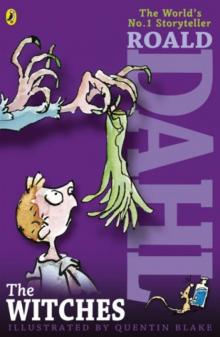 The Witches
The Witches James and the Giant Peach
James and the Giant Peach Charlie and the Great Glass Elevator
Charlie and the Great Glass Elevator Skin and Other Stories
Skin and Other Stories Kiss Kiss
Kiss Kiss Switch Bitch
Switch Bitch The Giraffe and the Pelly and Me
The Giraffe and the Pelly and Me Ah, Sweet Mystery of Life
Ah, Sweet Mystery of Life Fear
Fear The Great Automatic Grammatizator and Other Stories
The Great Automatic Grammatizator and Other Stories Someone Like You
Someone Like You Charlie and the Great Glass Elevator c-2
Charlie and the Great Glass Elevator c-2 More About Boy
More About Boy Tales of the Unexpected
Tales of the Unexpected The Umbrella Man and Other Stories
The Umbrella Man and Other Stories Dirty Beasts
Dirty Beasts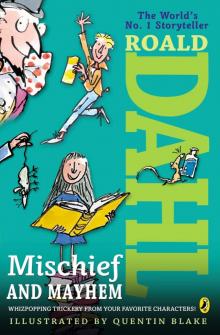 Roald Dahl's Mischief and Mayhem
Roald Dahl's Mischief and Mayhem The Collected Short Stories of Roald Dahl, Volume 1
The Collected Short Stories of Roald Dahl, Volume 1 The Missing Golden Ticket and Other Splendiferous Secrets
The Missing Golden Ticket and Other Splendiferous Secrets Billy and the Minpins
Billy and the Minpins Over to You
Over to You Going Solo
Going Solo Deception
Deception War
War Man from the South ee-3
Man from the South ee-3 More Tales of the Unexpected
More Tales of the Unexpected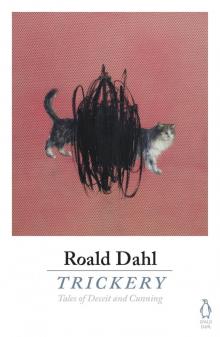 Trickery
Trickery Rhyme Stew
Rhyme Stew Charlie and the Chocolate Factory (Puffin Modern Classics relaunch)
Charlie and the Chocolate Factory (Puffin Modern Classics relaunch) D is for Dahl
D is for Dahl Roald Dahl Whoppsy-Whiffling Joke Book
Roald Dahl Whoppsy-Whiffling Joke Book Spotty Powder and other Splendiferous Secrets
Spotty Powder and other Splendiferous Secrets Charlie and the Chocolate Factory c-1
Charlie and the Chocolate Factory c-1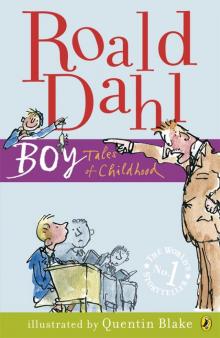 Boy
Boy Completely Unexpected Tales
Completely Unexpected Tales Madness
Madness Innocence
Innocence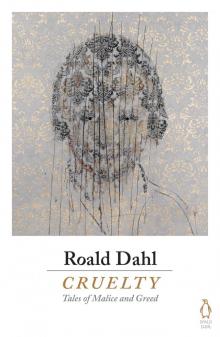 Cruelty
Cruelty George's Marvellous Medicine
George's Marvellous Medicine